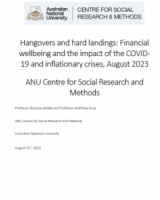Hangovers and hard landings: Financial wellbeing and the impact of the COVID-19 and inflationary crises, August 2023

Abstract
This paper uses data from the August 2023 ANUpoll as well as previous waves of data collection to analyse financial wellbeing in Australian, and how it has changed since prior to the COVID-19 pandemic. The August 2023 ANUpoll collected data from 4,204 Australians aged 18 years and over.
The paper shows that since April 2023, financial stress has been at a higher level than at any time since February 2020, when 26.7 per cent of Australians were finding it difficult or very difficult on their present income. The lowest level of financial stress using this measure was in November 2020, when only 17.3 per cent of Australians were finding it difficult or very difficult on their income, whereas in April and August 2023 it was 32.2 and 30.3 per cent respectively. There has been a widening gap in financial stress in the inflationary period compared to pandemic periods. Females, Aboriginal and Torres Strait Islander Australians, those with low education, and those in disadvantaged areas all pulled further away from the rest of the population in 2022/2023 compared to 2020/2021. Renters are still experiencing more financial stress than those with a mortgage, but the increase has been greater for the latter.
Since the start of the pandemic, there has been a large increase in the per cent of Australians who have undertaken a number of financial actions that indicate that they are experiencing financial stress. The biggest relative increase was for the proportion of people who renegotiated bills other than their mortgage, with 21.5 per cent of people saying they did so in the 12-months lead up to the August 2023 survey compared to 14.0 per cent for the January 2021 survey. There were also large increases in the proportion of people who spent less on groceries and essential items, the proportion of people who cut back on non-essential items, and the proportion who postponed major purchases.
Changes in financial stress and income were strongly associated with life satisfaction, psychological distress, and satisfaction with the direction of the country.








